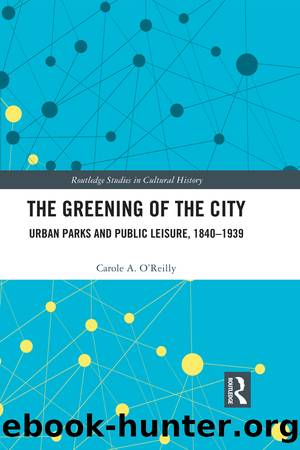The Greening of the City by Carole A. O'Reilly

Author:Carole A. O'Reilly [O'Reilly, Carole A.]
Language: eng
Format: epub
ISBN: 9781317961918
Barnesnoble:
Publisher: Taylor & Francis
Published: 2019-05-17T00:00:00+00:00
Parks Employees
The business of staffing Britainâs public parks often had modest beginnings. As the numbers of parks and open spaces grew, most towns and cities expanded their parks staff. In Cardiff, for example, the parks department consisted of two gardeners in March 1890, who were responsible for the care and maintenance of five gardens between them (A. Pettigrew, 1929, Volume 2, p. 14). By July 1890, five caretakers augmented these, one for each garden (A. Pettigrew, 1929, Volume 2, p. 14). By 1898, the parks department had 74 workmen on the payroll, including the park-keepers (A. Pettigrew, 1929, Volume 2, p. 64). This number had increased to 77 by 1905 (A. Pettigrew, 1929, Volume 2, p. 64).
The increasing professionalisation of park management and administration in the early twentieth century is illustrated by the gradual relaxation of attempts to control visitor behaviour directly. In general, Victorian parks drew their visitorsâ attention to the parks regulations principally through prominently displayed noticeboards, whose rules were enforced by park-keepers. As late as 1937, W. W. Pettigrew, the general superintendent of Manchester parks, wrote that such notices were necessary as park visitors needed to know what was allowed and what was not, thus establishing the boundaries of acceptable behaviour (W. Pettigrew, 1937, p. 88). Prior to the official opening of Heaton Park in 1902, the Manchester Guardian noted the enforcement of Corporation regulations in the park: âWhen it was lent to the public at Whitsuntide by its late owner, one could wander everywhere. Yesterday, there were policemen and keepers almost by the score, who gave the word to âkeep off the grassââ (27 June, 1902, p. 6).
This nostalgia for the former aristocratic owner omits the fact that under aristocratic ownership, the park was rarely accessible to the general public. The following day, the Manchester Guardian expressed the hope that âtoo much zeal will not distinguish the well-meaning custodians of our new park or the citizens who make the journey there may begin to feel that they are being dragooned into revoltâ (28 June, 1902, p. 5). The Manchester City News continued this theme the following year as it described how people walked on the grass in spite of being asked to refrain by the park-keeper: âIt is curious to note⦠that gentleman always walks on the grass himself, forgetting the moral influence of that actionâ (25 July, 1903, p. 3).
Contemporary poems satirised and bemoaned what was often perceived as the overly officious regulation of public parks and those who frequented them. Punch (p. 64) published the following in 1881:
Download
This site does not store any files on its server. We only index and link to content provided by other sites. Please contact the content providers to delete copyright contents if any and email us, we'll remove relevant links or contents immediately.
| Biographies | Company Profiles |
| Economic History |
Pale Blue Dot by Carl Sagan(4986)
The Rules Do Not Apply by Ariel Levy(4945)
Goodbye Paradise(3791)
Ogilvy on Advertising by David Ogilvy(3584)
Liar's Poker by Michael Lewis(3434)
Delivering Happiness by Tony Hsieh(3408)
Into Thin Air by Jon Krakauer(3370)
Purple Cow by Seth Godin(3180)
Rogue Trader by Leeson Nick(3033)
The Social Psychology of Inequality by Unknown(3010)
The Airbnb Story by Leigh Gallagher(2835)
4 - Harry Potter and the Goblet of Fire by J.K. Rowling(2693)
The Mind Map Book by Tony Buzan(2564)
Bossypants by Tina Fey(2514)
Claridge's: The Cookbook by Nail Martyn & Erickson Meredith(2391)
All the President's Men by Carl Bernstein & Bob Woodward(2357)
Six Billion Shoppers by Porter Erisman(2289)
Master of the Game by Sidney Sheldon(2274)
Alibaba by Duncan Clark(2071)
